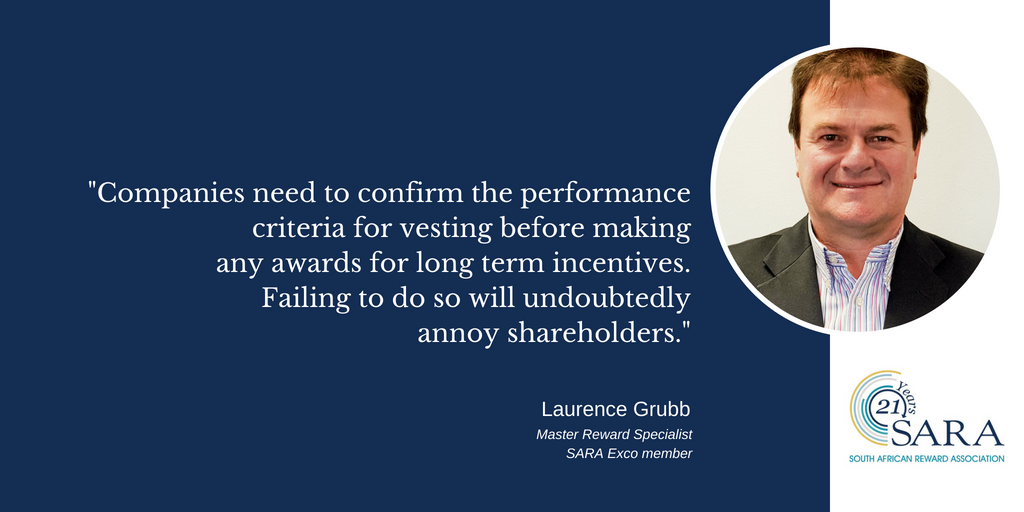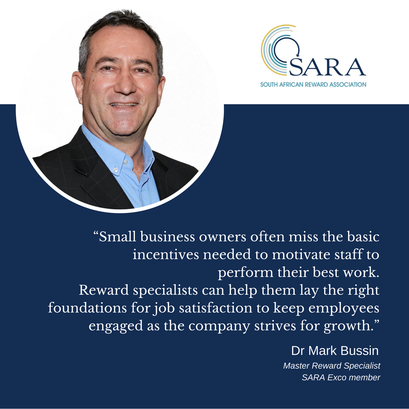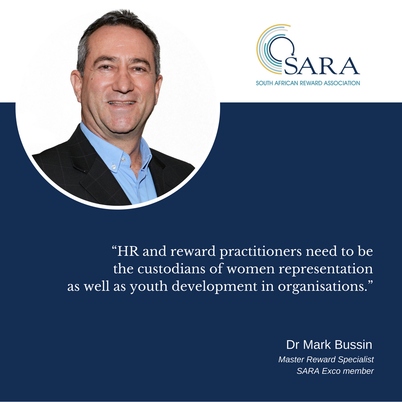|
Recent reports of shareholders voting against executive remuneration structures have again highlighted the need for increased transparency in the disclosure of not only the amounts paid, but how the amounts were calculated and the link to performance. Many companies have made significant progress with the disclosure of executive pay and the quality and content of remuneration policies and implementation reports.
However, the improved transparency of certain excessive executive pay packages has also fuelled the perception that all executives are paid exorbitant amounts of money, causing an ever increasing pay gap. Laurence Grubb, Master Reward Specialist and executive committee member of the South African Reward Association (SARA), says a handful of executives are still able to manipulate remuneration committees, despite notable efforts to follow the principles set out in King IV and the association’s guidelines. Committees agree to targets which are a little too soft or potential remuneration that is out of line with industry. “Although these executives are in the minority, it remains a concern and needs to be contained.” Independent advice needed Grubb says remuneration committees should be entitled to obtain independent advice from their own remuneration consultants to validate what has been presented to them by the executives. The cost for this service should be borne by the company. SARA published guidelines on the drafting of a remuneration policy and the implementation report at the beginning of the year which follows the principles set out in King IV. Some ‘old’ long term incentive schemes may have awards which were not linked to performance. Those shares may now be vesting, and with no performance linked to them, it is quite possible that shareholders will vote against such schemes. Grubb says companies need to confirm the performance criteria for vesting before making any awards for long term incentives. Failing to do so, will undoubtedly annoy shareholders. Barclays Africa experienced this first hand when shareholders voted against the company’s policy and implementation report earlier this month (May 2018). In terms of the King IV principle on remuneration, the policy should record the measures that the board commits to when 25% of the votes are exercised against either the remuneration policy or the implementation report, or both. These actions should then be communicated in the background statement in the following year. South Africa is the only country in which the threshold for these remedial measures is as low as 25%. In Australia, the UK and Belgium, among others, remedial measures are only mandated if 50% or more of the votes are cast against the remuneration policy and implementation report. Pay gap realities The pay gap in South Africa remains a burning issue, although companies have been trying to address it by offering larger annual increases for lower level workers and smaller increases at executive level. However, an increase of 5% on R2 million will always make a bigger gap than 8% on R100, 000. Several companies have also introduced the minimum wage, and in some instances, wages which exceed the minimum wage. In countries where the pay gap is much narrower, the level of skills, education and productivity of the lower end workers are much higher than in South Africa. Grubb says companies operating in those countries are typically able to pay much higher rates to their lower level employees because of the higher skills and productivity levels. “Unfortunately, in countries where education is severally limited and not at the right standard, the impact is felt mostly by those whose skills and level of education do not offer them the opportunity to increase their earning potential.” Companies find it difficult to continually pay higher salaries to lower levels and, inevitably where that does happen, there are job losses.
0 Comments
The country’s celebration of a welcome change in leadership was quickly followed by an upbeat State of the Nation Address from newly-elected President Cyril Ramaphosa. Acknowledging that South Africa’s economy will be sustained by small businesses, the President stated that it is “our shared responsibility to grow this vital sector.” In a closing reference to Hugh Masekela’s song “Thuma Mina”, he concluded: “Now is the time to lend a hand. Now is the time for each of us to say ‘send me’.”
The reward practitioner's role Dr Mark Bussin, Master Reward Specialist, Executive Committee Member of SARA (South African Reward Association) and Chair of 21st Century agrees completely. “There is a definite opportunity for reward practitioners to play a role and lend a hand to small businesses,” he says. According to Dr Bussin, SARA members are typically employed by large corporations, but can still do their part by offering free advice and services to small business managers and startup entrepreneurs. “We may have family, friends or acquaintances who run or are starting their own business, and who employ several workers. This is a great opportunity to contribute to their growth because at that level, not many consider the productivity fostered by a solid reward structure.” Introducing reward to small business Small business owners are often completely focused on operations, finances, marketing and sales but miss the basic incentives needed to motivate staff to perform their best work. Reward specialists can help them lay the right foundations for job satisfaction to keep employees engaged as the company strives for growth. Dr Bussin mentions several elements that must be in place from the start: “If these are cobbled together too late, only after dissatisfaction arises, employers could find their business suddenly struggling as their top workers exit.” His points include being clear on job descriptions and their responsibilities; establishing who reports to whom; defining pay scales with minimum and maximum limits; ensuring meticulous tax administration; documenting the rules governing bonus schemes; clarifying if employees have ownership in the company or not; having employment contracts that respect the law; and developing clear recognition schemes and promotion paths. While small businesses are usually not capable of offering extended non-financial rewards, they should start planning for a time of growth when development, training, a pleasant work environment, wellness programmes and other incentive schemes become more important to attracting and retaining valuable talent. How big businesses can help Dr Bussin also strongly encourages large organisations to become involved in such initiatives rather than discouraging them. “Every corporation should identify several small business candidates and lend out their reward practitioners for free for an hour or two a week as part of their CSI projects,” he says. “Just doing this, they too could make a significant contribution to the economy.” Small businesses face many challenges getting off the ground and surviving their first five years. Reward professionals can answer the call of “send me” by helping them build a motivated, loyal workforce to add greater assurance of their success, especially when the going gets tough. ENDS MEDIA CONTACT: Juanita Vorster, 079 523 8374, [email protected], www.atthatpoint.co.za For more information on SARA please visit: Website: www.sara.co.za Twitter: @SA_reward LinkedIn: South African Reward Association Facebook: SARA – South African Reward Association The prosperity and equality of the nation’s workforce – alluded to in the recent State of the Nation address by President Ramaphosa – is in large part determined by reward practitioners: professionals that advise companies on how to structure financial and non-financial pay elements to compensate employees for their work.
“Inequality was mentioned at least ten times during the address,” says Dr Mark Bussin, a Master Reward Specialist, Exco member of the South African Reward Association (SARA) and Chairperson of 21st Century. “Reward practitioners must take this seriously in their practices and policies by reporting the wage gap in annual financial statements, and finding ways to close the wage gap in companies.” Tough calls for private sector reward practitioners Reward and HR practitioners also need to step up their focus on training and education. Tough calls are necessary on employing more people through internships, and creating entrepreneurs within companies. Tougher yet will be the decision to release these successful candidates to industry in order to let the larger economy benefit from the initial training and development investment. Tough calls for public sector reward practitioners HR and reward practitioners in government will be tasked with cutting costs, cutting pay increases, and managing fruitless and wasteful expenditure across the public sector workforce. “Reward practitioners need to be steady, well informed and consistent in their approach,” says Bussin. “They also need to stand up to those that resist changes for the greater good, as well as new leaders who want sweeping changes just for the sake of it.” Tough calls for individual practitioners HR and reward practitioners furthermore need to be the custodians of women representation as well as youth development in organisations. Bussin advises reward practitioners to follow national policy in all areas including benefits, working conditions and employment practices. Reward practitioners will also have the added challenge of supporting government and business in creating increased remuneration for 6 million people. The implication of this is that practitioners focus on getting their remuneration governance right and working without any further delay. “As per our President’s closing words, all reward practitioners have a chance to make a difference right where they are by moving beyond historic practices and being willing to say “send me” to do the tough work where it is necessary.” ENDS MEDIA CONTACT: Juanita Vorster, 079 523 8374, [email protected] For more information on SARA please visit: Website: www.sara.co.za Twitter: @SA_reward LinkedIn: South African Reward Association Facebook: SARA – South African Reward Association South Africa is desperate for skilled professionals to urgently bolster economic growth  Martin J R Westcott, the Executive Chairman of P E Corporate Services Martin J R Westcott, the Executive Chairman of P E Corporate Services Fragile markets, stringent visa laws and a surge globally of violence against foreigners have done little to curb businesses sending staff on assignments abroad. South Africa is coming out as a top location for international professionals finding employment, along with its developing BRIC counterparts. “South Africa could do well to embrace in-bound mobility and create total reward packages that speak to the individual needs of these professionals,” says Martin J R Westcott, the Executive Chairman of P E Corporate Services. “The fact that skills shortages in South Africa are both substantial and entrenched is a key factor constraining economic growth.” Westcott, speaking on expatriation trends during a workshop of the South African Reward Association (SARA), identified how the economic slow-down and fewer job opportunities in developed economies are seeing a steady reversal of the country’s net ‘brain drain’. This is combined with a severe slippage of exchange rate and the country’s comparatively high standard of living. “Our most recent international pay comparison studies indicate that South Africa is ranked second only to the United States in terms of purchasing power of the net disposable income enjoyed by executives and professionals,” explained Westcott. Balancing mobility and remuneration “Individuals who are well established in their jobs in the home country will take an off-shore assignment provided that it is financially beneficial for the entire family,” says Nevan Naidoo, the Head of Reward across Africa for the Standard Bank Group. “Employees focusing on career advancement, with ambitions of taking on more senior roles in a global organisation, will see assignments off-shore as a platform for advancement. In these instances planned succession will be a key driver instead of money.” “The appointment of foreign nationals must be contextualised and well understood by local employers to prevent any frustration,” says Naidoo. “While security challenges are one of the main areas that influence expatriation considerably, businesses are creating the necessary awareness regarding operating in Africa specifically,” adds Kohl Van Rensburg, Head of Reward: Africa, Retail Banking and Wealth for the Standard Bank Group. “Companies are being pro-active in making sure they remain safe: that good evacuation processes are in place, excellent global medical cover is provided, and so on.” The division between home country and host country approaches to expatriate remuneration have been near on par for many years. Most expatriates who relocate for short to medium term assignments retain domestic financial commitments which create practical difficulties in switching to a host country pay model. Van Rensburg recommends that businesses adopt the split payroll methodology; where “a percentage of salary is paid in the home country with a smaller percentage paid in the host country, dependant on cost of living indices in the host country.” While there must be correct processes and systems in place to ensure a company’s expatriation policy is well executed, measuring the success of assignments is difficult and dependent on specifics of the assignment, says Westcott: “There has, however, been very strong growth in the use of key performance indicators (KPI) for performance evaluation and bonus determination in recent years and, in particular, the alignment of KPIs with corporate and business unit strategies.” ENDS MEDIA CONTACT: Cathlen Fourie, 012 644 2833, [email protected], www.atthatpoint.co.za For more information on SARA please visit: Website: www.sara.co.za Twitter: @SA_reward LinkedIn: South African Reward Association Facebook: SARA – South African Reward Association |
Archives
March 2023
Welcome to the South African Reward Association newsroom.
Categories
All
|




 RSS Feed
RSS Feed